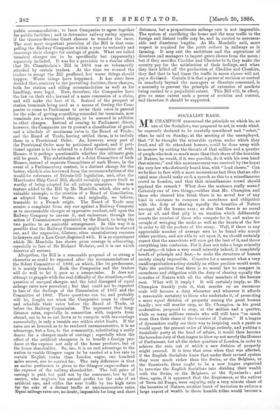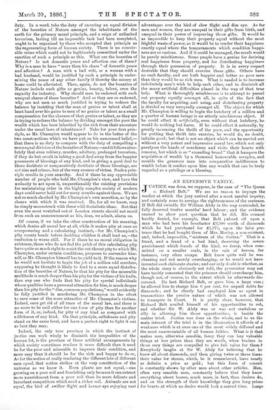SOCIALIST RAGE.
MR. CHAMPION announced the principle on which he, as one of the Socialists, was prepared to act, in words which he expressly declared to be carefully considered and "sober," when he said on Sunday, at the meeting of the unemployed, that "if he thought the miserable system under which they lived, and all its attendant horrors, could be done away with to-morrow by cutting the throats of that million and a quarter of people who took so much more than their share of the bounties of Nature, he would, if it was possible, do it with his own hand that minute ;" and this announcement was received by (we hope) the very few who distinctly heard him, with " loud cheers." Can we be face to face with a more momentous fact than that an edu- cated man should make such a speech as this to a miscellaneous crowd in London, and that that miscellaneous crowd should applaud the remark P What does the sentence really mean P Certainly one of two things,—either that Mr. Champion and those who cheered him think there is no moral law of any kind in existence to compare in sacredness and obligation with the duty of sharing equally the bounties of Nature amongst all the human race ; or else that there is no moral law at all, and that pity is an emotion which deliberately counts the number of those who compete for it, and makes no scruple of wringing the necks as well as the hearts of the few in order to fill the pockets of the many. Well, if there is any appreciable number of average men to be found who accept either position, and are able to act upon it, we should certainly expect that the anarchists will soon get the best of it, and throw everything into confusion. For it does not take a large minority of society,—it takes a very small minority indeed, if completely bereft of principle and fear,—to make the structure of human society simply impossible. Conceive for a moment what a very small organisation acting steadily on either position would mean. Take the position that there is no moral law to compare in sacredness and obligation with the duty of sharing equally the bounties of Nature with all the other members of the human race. What will it imply ? It will certainly imply, as Mr. Champion frankly puts it, that murder on an enormous scale will become a duty whenever and wherever it affords a reasonable certainty to those who undertake it, of promoting a more equal division of property among the great human family ; nor will murder stop, as Mr. Champion, in his great moderation, proposed to stop, at the million and a quarter, while so many millions remain who will still have "so much more than their share of the bounties of Nature." If a league of dynamiters really see their way to inspiring such a panic as would upset the present order of things entirely, and putting a Socialistic party at the head of affairs, it would then become the bounden duty of that league to blow up not merely the Houses of Parliament, but all the richer quarters of London, in order to achieve the ruin out of which a new division of property might proceed. It is true that even when that was effected, if the English Socialists knew that under their revised system they were much richer than the Swiss, or the Belgians, or the Spaniards, there ought to be a new league organised to terrorise the English Socialists into dividing their wealth with the Swiss, or the Belgians, or the Spaniards ; and then, again, if it appeared that the Esquimaux, or the natives of Terra del Fuego, were enjoying only a very minute share of the bounties of Nature, another burst of terrorism to enforce a large export of wealth to those humble tribes would become a duty. In a word, take the duty of ensuring an equal division of the bounties of Nature amongst the inhabitants of the earth for the primary moral principle, and a reign of unlimited terrorism, lasting till an impossible task had been completed, ought to be organised by those who accepted that principle as the regenerating force of human society. There is no conceiv- able crime which could not be legitimately committed under the sanction of such a principle as this. What are the bounties of Nature ? Is not domestic peace and affection one of them ? Why is a man to have " more than his share " of domestic peace and affection P A man with a bad wife, or a woman with a bad husband, would be justified by such a principle in under- mining the peace of any other family if thereby the misery at home could be alleviated. Then, again, do not the bounties of Nature include such gifts as genius, beauty, talent, even the capacity for industry. Why should men be endowed with such unequal shares of these bounties P And as they are so endowed, -why are not men as much justified in trying to redress the balance by insisting that the man of genius or talent shall at least hand over his gains to men of no genius or talent as a small compensation for the absence of that genius or talent, as they are in trying to redress the balance by dividing amongst the poor the wealth which has been inherited by the rich from their ancestors under the usual laws of inheritance ? Take for your first prin- ciple, as Mr. Champion would appear to do in the better of the two constructions which we have put on his announced belief,— that there is no duty to compare with the duty of compelling a more equal division of the bounties of Nature,—and it follows abso- lutely that even robbery, murder, adultery, prolonged terrorism, if they do but result in taking a good deal away from the happier possessors of blessings of any kind, and in giving a good deal to those destitute or comparatively destitute of those blessings, are not sins and crimes, but of the very essence of virtue. Such a prin- ciple results in pure anarchy. And if there be any appreciable number of people who hold Mr. Champion's view, and have the audacity to act upon it, unquestionably the existing provisions for maintaining order in the highly complex society of modern days could never hold out for many months against them. We are not so much shocked by Mr. Champion's own assertion, as by the cheers with which it was received. He, for all we know, may be simply moonstruck with these wild Socialistic ideas. But that even the most wretched out of London streets should not recoil from such an announcement as his, does, we admit, alarm us.
Of course, if we take the other construction of his meaning, which denies all moral law at all, while it makes pity at once an overpowering and a calculating instinct,—for Mr. Champion's pity counts heads before deciding whither it shall lead us,—the confusion is worse still. For if there be no moral obligation in existence, those who do not feel the prick of this calculating pity have quite as much right to resist the cut-throat pity to which Mr. Champion, under certain conditions, proposes to surrender him- self, as Mr. Champion himself has to yield to it. If the reason why he would not hesitate to begin the job of a million odd murders, supposing he thought it likely to lead to a more equal distribu- tion of the bounties of Nature, be that his pity for the miserable multitude is much deeper than his pity for the victims of his knife, then any one who finds that his pity for special individuals whose qualities have a personal attraction for him, is much deeper than his pity for the " dim, common populations," would evidently be fully justified in murdering Mr. Champion in the effort to save some of the more attractive of Mr. Champion's victims. Indeed, once get rid of all trace of the moral law, and there is no more to be said either for one form of pity than for another form of it, or, indeed, for pity of any kind as compared with selfishness of any kind. On that principle, selfishness and pity stand on the same level, and have a perfect right to fight it out as best they may.
Indeed, the only true province in which the instinct of justice can work wisely to diminish the inequalities of the human lot, is the province of those artificial arrangements by which society sometimes renders it more difficult than it need be for the poor and miserable to improve their condition, and more easy than it should be for the rich and happy to do so, As for the notion of really rendering the different lots of different men equal, that notion strikes at the very constitution of the universe as we know it. Even plants are not equal,—one growing on a poor soil and flourishing only because it can extract more nourishment from a poor soil than its more delicate and luxuriant competitors which need a richer soil. Animals are not equal, the bird of swifter flight and keener eye enjoying vast advantages over the bird of slow flight and dim eye. As for men and women, they are unequal in their gifts from birth, and unequal in their power of improving those gifts. It would be as impossible to keep their property equal without the most frighful waste of power, as it would be to render their happiness exactly equal where the temperaments which condition happi- ness are so various. And if it could be managed, the result would be purely mischievous. Some people have a genius for deriving real happiness from property, and for distributing happiness through their possession of property. It is in every respect desirable that they should exercise these gifts. Others have no such faculty, and are both happier and better as poor men than they would be as rich men. What is needed is to increase indefinitely men's wish to help each other, and to diminish all the many artificial difficulties placed in the way of that true help. What is thoroughly mischievous is to attempt to parcel out property equally amongst all, in spite of the fact that the faculty for acquiring, and using, and distributing property is divided so very unequally amongst all. The object for which Mr. Champion is willing to begin the butchery of a million and a quarter of human beings is an utterly mischievous object. If he could effect it artificially, even without that butchery, he would do nothing but harm. If he could effect it naturally, by greatly increasing the thrift of the poor, and the opportunity for putting that thrift into exercise, he would do, no doubt, infinite good ; but that is not an object which can be carried out without a very potent and impressive moral law, which not only paralyses the hands of murderers and visits their hearts with remorse, but which is so " exceeding broad " that it hampers the acquisition of wealth by a thousand honourable scruples, and moulds the generous man into comparative indifference to wealth before it confers upon him any wealth that can be truly regarded as a privilege or a blessing.



































 Previous page
Previous page